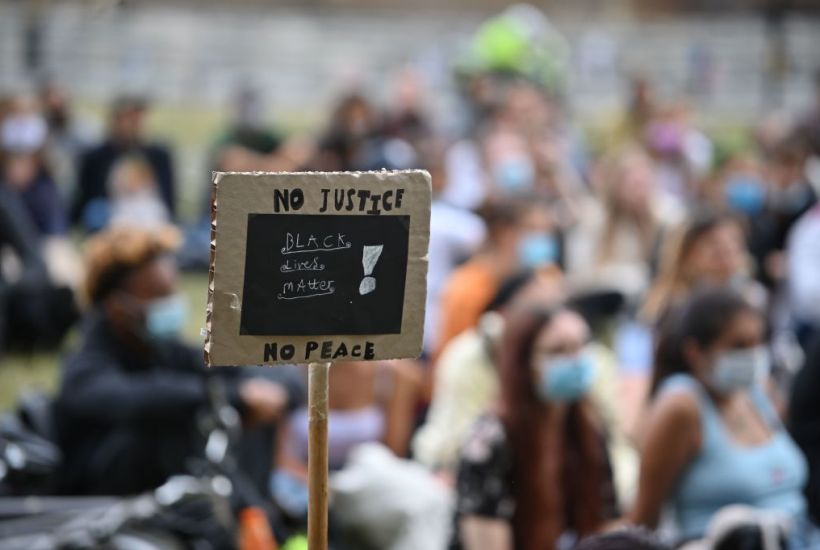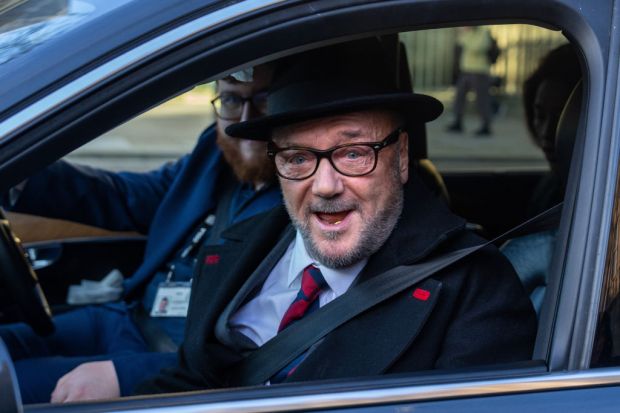Charles Dickens was not a nice man. He was horrid to his family, remarking on the birth of one of his sons that ‘on the whole I could have dispensed with him.’ When he fell in love with Ellen Ternan, an actress 27 years his junior, he threw his long-suffering wife out, and sent her only three letters in the 12 remaining years of his life. Despite having one of the best imaginations in English literature, his depictions of women alternated between terrible crone (Miss Havisham) to simply prone (Esther in Bleak House). Ah well, we used to say: terrible man, brilliant books. Funny old place, the past.
Well, times have changed. Specifically, the cause has changed. If nobody much was agonised by Dickens the terrible misogynist and child-disparager, then – thanks to the Black Lives Matter movement – they have suddenly become keenly upset by his racism. Which, these days, means reaching for the can of spray paint. This is just what former Kent councillor Ian Driver did this week when he daubed ‘Dickens Racist’ on the Dickens Museum and several other sites in Broadstairs, Kent, where the author frequently stayed.
Yet despite the daily tide of vandalism, topplings, renamings and removals intended to purify our public sphere, the attempt to desecrate Dickens is eye-catching. Not just because it shows anti-racist activists are increasingly turning their attention from statues, and towards our whole artistic inheritance, but also because it offers a clue to a sinister, unavoidable side of Black Lives Matter: its attitude towards Jews. Dickens was one of most overt anti-Semites in Victorian letters, but when Mr Driver sprayed ‘racist’, there is no evidence to suggest he was thinking of Jews.
It has become clear that BLM is hawk-eyed about racism but that does not include watching out, even slightly, for anti-Semitism. Often this is related to the mouth-frothing anti-Zionism of anti-racism activists since the 1970s, which burst into view over the weekend when UK Black Lives Matter announced that
‘As Israel moves forward with the annexation of the West Bank, and mainstream British politics is gagged of the right to critique Zionism, and Israel’s settler colonial pursuits, we loudly and clearly stand behind our Palestinian comrades. FREE PALESTINE’.
It’s no wonder that the Black Lives Matter movement has a blind spot when it comes to anti-Semitism. Jews, after all, are easily elided with ideas of the monstrous Jewish state, as Corbyn’s party made clear. Anti-Zionism allows Jews to be cast as the white oppressor, which means when we draw attention to anti-Semitism, we are often accused of right-wing manipulation and conspiracy.
And so the same unforgiving standards applied to racists by the hard-left are never used towards anti-Semites. While everyone from Rhodes to Dickens to Fawlty Towers to obscure 18th century merchants have been singled out for removal on racist grounds, nobody has scanned our history for anti-Jewish associations. There has been no mention either of Volkswagen, ThyssenKrupp, IG Farben, Bosch, Daimler-Benz, Hugo Boss, Deutsche Bank and Siemens – all of whom greedily profited off Jewish slave labour less than 80 years ago.
Nor has the anti-racist movement bothered to look at our cultural inheritance; composers, artists, authors. There have not been calls for the Wagner festival at Bayreuth – where tickets are gold-dust for the international cultural elite, many of whom are progressives – to be closed down. Would a festival dedicated to a hero of the slave-owning Confederacy continue with unquestioned support in the present climate? Probably not.
The case of Dickens himself is telling. He was racist, as many people were during his lifetime. He wrote in 1867 in the Noble Savage that Indians should be ‘civilised off the face of the earth’ – his son Walter, aged 16, was serving at the time as a cadet in India. But he was also appalled by what he saw of slavery in America, and called it an ‘accursed and detested system’.
When it came to anti-Jewish racism, however, things were simpler. As the scholar and lawyer Anthony Julius has argued, Dickens was part of a long English tradition of ‘literary anti-Semitism’, in which characterisations of Jews tended to follow the structure of the blood libel: Oliver Twist’s Fagin is a prime example. As Julius writes, Dickens’s genius enabled him to ‘reach past conventional early nineteenth-century representations of Jews to more archaic representations – nursery tales of children-hating Jews, Sunday School tales of Jesus-persecuting Jews, ballads and songs, popular poetry and broadsheet narratives, the Jew-specific terrors, sedimented in the oral culture of the nation.’
By its own supposed logic, the anti-racism movement’s cultural cleansing arm should stretch to all this, but it can’t and won’t. This offers a frightening insight into the ideological direction of the ‘anti-racist’ future.
But you know what? In every other respect, letting Dickens’ anti-Semitism loiter in the past is – truth be told – fine by me. Were Jews to boycott every piece of culture associated with flagrant anti-Semitism, we’d be vastly the poorer for it. I still mainline Trollope novels. Dickens was formative in my development. My favourite 20th century author is Kingsley Amis, a noted anti-Semite. I ride in Volkswagens. I listen to Wagner and have friends who attend Bayreuth. And I don’t agonise about whether it is right to indulge in this or that work by someone who was anti-Semitic or racist, because they all were. A simple fact remains: the writers, artists, inventors and other geniuses of our past could be racist and brilliant. We can wince at Fagin and cry in sympathy with Jo, the orphaned street sweeper in Bleak House. If we can keep our eye on that small but potent word, ‘and’, we’ll be alright. Otherwise, the refusal to take the rough with the smooth will leave us with darkness and more darkness.
<//>
Got something to add? Join the discussion and comment below.
Get 10 issues for just $10
Subscribe to The Spectator Australia today for the next 10 magazine issues, plus full online access, for just $10.




















Comments
Don't miss out
Join the conversation with other Spectator Australia readers. Subscribe to leave a comment.
SUBSCRIBEAlready a subscriber? Log in